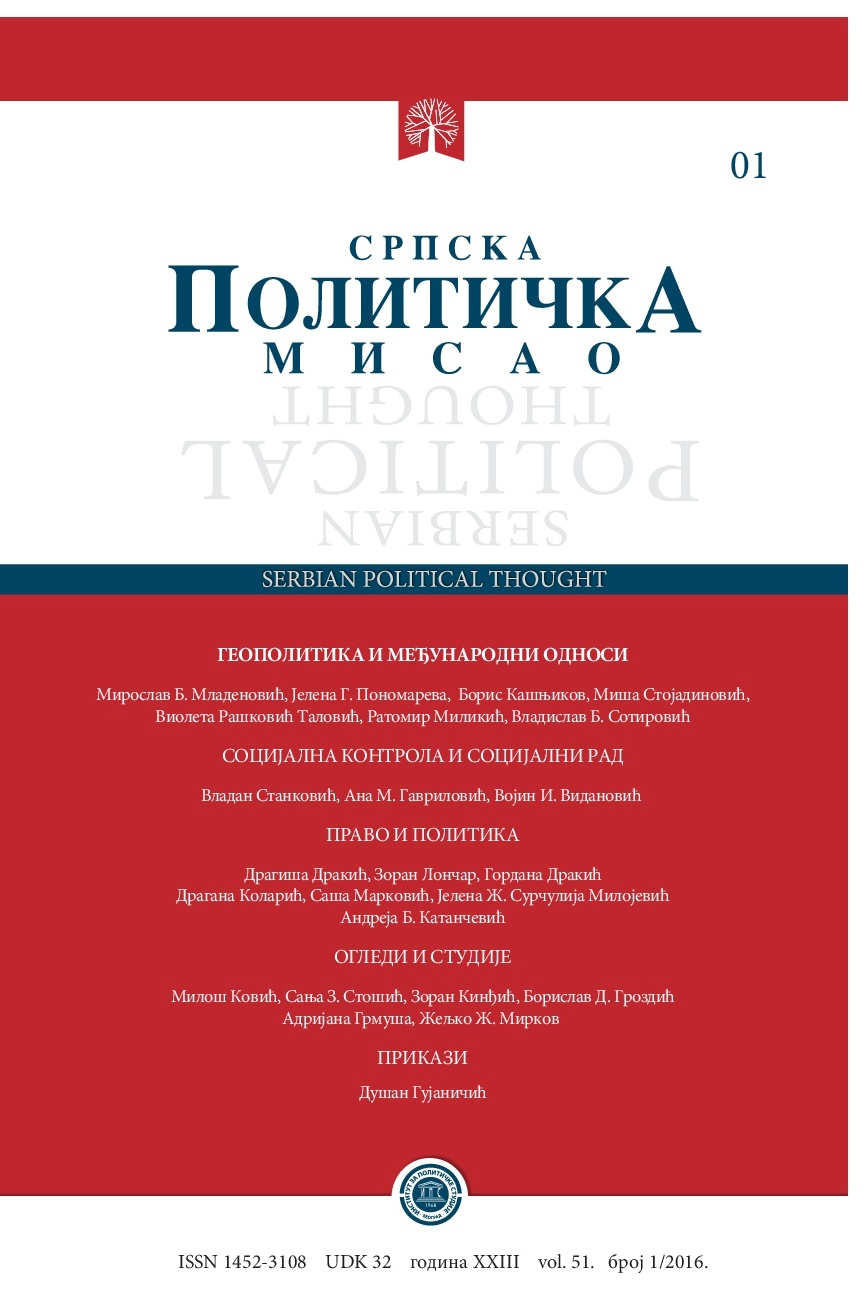Неке правно-политичке поставке новог Закона о полицији
Some Legal and Political Postulates of New Law on Police
Author(s): Dragana Z. Kolarić, Saša M. MarkovićSubject(s): Human Rights and Humanitarian Law, Labor relations, Security and defense, Transformation Period (1990 - 2010), Present Times (2010 - today), EU-Approach / EU-Accession / EU-Development, EU-Legislation
Published by: Институт за политичке студије
Keywords: Ministry; Police; sector; Minister; Police Director; police officers; other employees; employment; internal control; human resources;
Summary/Abstract: New Law on Police has been adopted at the time marked by multifaceted reforms. Full membership in the EU, i.e. European integration processes require solving numerous preliminary issues related to the harmonization with the EU legal heritage. Naturally, the reasons for the adoption of new legislation can also be the result of our bad experience and the existence of the need to govern some issues by certain regulations in a better, more precise and more efficient manner. From legally-technical point of view, and in order to establish coherent legal system in Serbia, it was necessary to harmonize it with many other regulations adopted in our country recently. Legal-political postulates, i.e. the concept of the new law, can to a large extent offer the answer regarding the goals wished to achieve. On this occasion we shall initiate some questions which we consider important. First of all, it is the question if the legislator has successfully fulfilled the main task, and that is the protection of fundamental freedoms and rights of the citizens, the protection of their security and the security of the Republic of Serbia. The fundamental constitutional postulates and their effective or declarative implementation are also closely connected with the protection of fundamental rights and freedoms. Speaking of the announcements, statements or proclaiming of some principles without real effect, the question is asked if it was necessary at some points within the law, when it implicitly results from other regulations. There are also some open dilemmas about the new provisions which are not precisely determined by this law and leave space for possible abuses by their structuring within by-laws. When 1991 Law on Internal Affairs 1991 ceased to have effect and upon the adoption of 2005 Law on Police, our legislator continued the tendency of thorough regulation of internal affairs and more precise regulation of the field of public security. 2016 Law on Police (hereinafter referred to as ‘the Law’), although a new legal text, is actually an expanded and modified version of the 2005 Law on Police. Judging by the title, at first glance the Law seems to regulate only the field of the police work. However, it refers to all segments of work of the Ministry of Internal Affairs, in other words the provisions referring to the Police, i.e. the central organizational unit of the Ministry – the Police Directorate, make only a part of the law. Numerous novelties characterize the new Law: police powers are more closely regulated, as well as the tasks, measures and actions taken by the police, there is a more thorough and more precise organization of the Ministry and human resources management, as well as the rights and obligations in the field of labour relations of the employees. The role of the Internal Control Sector (hereinafter referred to as ICS) has been strengthened. This organizational unit of the Ministry, when compared with the previous law, has many new powers, such as preventive control supervision of all organizational units of the Ministry as just one of them, and for the first time since its founding it is actually responsible to control the work of all people employed by the Ministry. Out of many novelties which suggest some political bases of the new Law, we shall review in more detail the selection of the Police Director and his/her position and role, the position and role of the Minister in relation to the ICS, the provisions on termination of employment by the power of law as well as their relation to the constitutionally proclaimed right to the presumption of innocence. As for certain provisions of the Law, from the legal point of view, taking into account the importance of opposing to certain forms of crime and crime in general, we shall analyze the provisions referring to the suppression of family violence, the suppression of corruption by strengthening the ICS, and the concepts of community policing and Intelligence Led Police
Journal: Српска политичка мисао
- Issue Year: 2016
- Issue No: 1
- Page Range: 169-197
- Page Count: 29
- Language: Serbian

